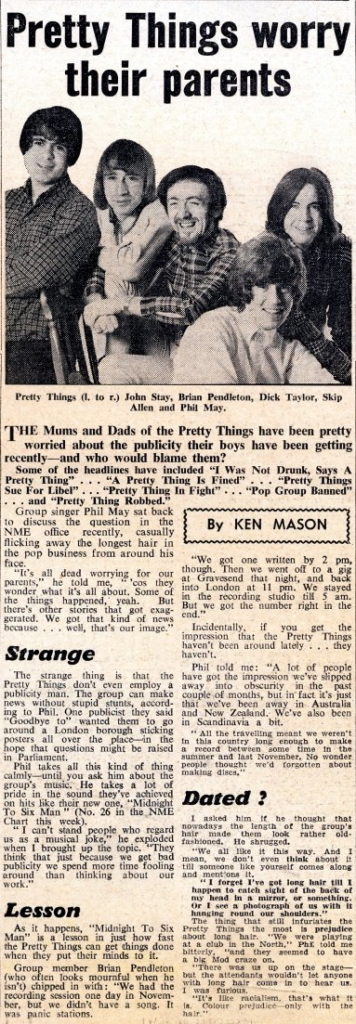Cet article de Ken Mason est paru dans le numéro 994 de l’hebdomadaire britannique New Musical Express, daté du 28 janvier 1966. Comme toujours, c’est la réputation des Pretty Things et leurs cheveux longs qui intéressent le plus le journaliste, mais Phil May et Brian Pendleton prennent soin de le recadrer sur ce qui compte vraiment : la musique. Ils sont particulièrement fiers de leur dernier single, Midnight to Six Man, écrit à la volée et enregistré en l’espace d’une nuit de novembre après un concert.

Transcription
The Mums and Dads of the Pretty Things have been pretty worried about the publicity their boys have been getting recently—and who would blame them?
Some of the headlines would have included “I Was Not Drunk, Says A Pretty Thing”… “A Pretty Thing Is Fined”… “Pretty Things Sue For Libel”… “Pretty Thing In Fight”… “Pop Group Banned”… and “Pretty Thing Robbed.”
Group singer Phil May sat back to discuss the question in the NME office recently, casually flicking away the longest hair in the pop business from around his face.
“It’s all dead worrying for our parents,” he told me, “’cos they wonder what it’s all about. Some of the things happened, yeah. But there’s other stories that got exaggerated. We got that kind of news because… well, that’s our image.”
The strange thing is that the Pretty Things don’t even employ a publicity man. The group can make news without stupid stunts, according to Phil. One publicist they said “Goodbye to” wanted them to go around a London borough sticking posters all over the place—in the hope that questions might be raised in Parliament.
Phil takes all this kind of thing calmly—until you ask him about the group’s music. He takes a lot of pride in the sound they’ve achieved on hits like their new one, “Midnight To Six Man” (No. 26 in the NME chart this week).
“I can’t stand people who regard us as a musical joke,” he exploded when I brought up the topic. “They think that just because we get bad publicity we spend more time fooling around than thinking about our own work.”
As it happens, “Midnight To Six Man” is a lesson in just how fast the Pretty Things can get things done when they put their minds to it.
Group member Brian Pendleton (who often looks mournful when he isn’t) chipped in with: “We had the recording session one day in November, but we didn’t have a song. It was panic stations.
“We got one written by 2 pm, though. Then we went off to a gig at Gravesend that night, and back into London at 11 pm. We stayed in the recording studio till 5 am. But we got the number right in the end.”
Incidentally, if you get the impression that the Pretty Things haven’t been around lately… they haven’t.
Phil told me: “A lot of people have got the impression we’ve slipped away into obscurity in the past couple of months, but in fact it’s just that we’ve been away in Australia and New Zealand. We’ve also been in Scandinavia a bit.
“All the travelling meant we weren’t in this country long enough to make a record between some time in the summer and last November. No wonder people thought we’d forgotten about making discs.”
I asked him if he thought that nowadays the length of the group’s hair made them look rather old-fashioned. He shrugged.
“We all like it this way. And I mean, we don’t even think about it till someone like yourself comes along and mentions it.
“I forget I’ve got long hair till I happen to catch sight of the back of my head in a mirror, or something. Or I see a photograph of us with it hanging round our shoulders.”
The thing that still infuriates the Pretty Things the most is prejudice about long hair. “We were playing at a club in the North,” Phil told me bitterly, “and they seemed to have a big Mod craze on.
“There was us up on the stage—but the attendants wouldn’t let anyone with long hair come in to hear us. I was furious.
“It’s like racialism, that’s what it is. Colour prejudice—only with the hair.”
Source : WorldRadioHistory.com (PDF).